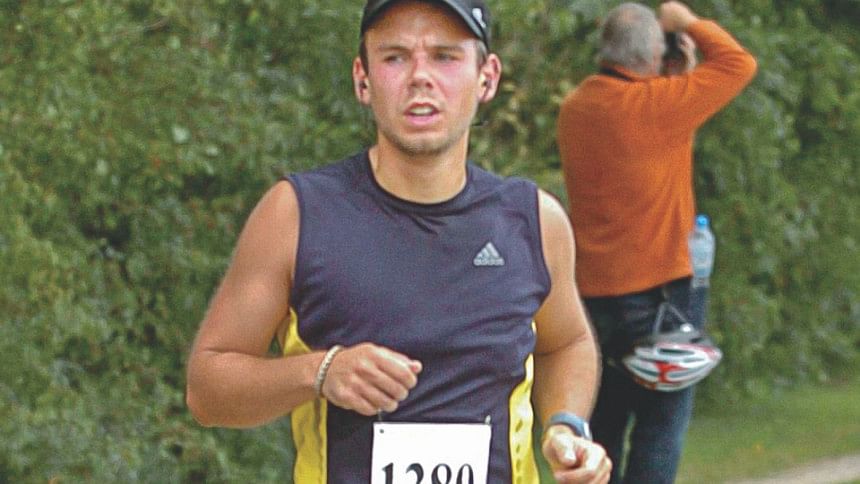Co-pilot hid medical condition: prosecutors

Documents show that Andreas Lubitz, the co-pilot who is believed to have deliberately crashed a Germanwings jet into the French Alps on Tuesday, had a medical condition that he hid from his employer, prosecutors in Düsseldorf, Germany, said yesterday.
Prosecutors said that among the items found at Lubitz's home was a doctor's note relieving him from his duties because of an illness that covered the day of the crash and another that had been torn up. These documents “support the preliminary assessment that the deceased hid his illness from his employer and colleagues,” the prosecutors said in a statement.
The German investigators said they had not found a suicide note or “any indication of a political or religious” nature among the documents secured in Lubitz's apartment. “However, documents were secured containing medical information that indicates an illness and corresponding treatment by doctors,” Ralf Herrenbrück, a spokesman for prosecutors in Düsseldorf, said in a statement.
Germany's Federal Aviation Office said yesterday that a medical certificate issued to Lubitz that allowed him to fly noted that he had a medical condition, although it did not specify whether it was related to a psychological issue.
Investigators have been combing through Lubitz's background, including whether he might have had a history of depression or psychological problems. They are looking into Lubitz's family background, and whether he had financial troubles or difficulties in his personal relationships.
Lubitz, 27, is believed to be responsible for slamming Germanwings Flight 9525 into a mountainside in the French Alps on purpose, killing all 150 on board, while en route from Barcelona, Spain, to Düsseldorf. Prosecutors are examining several theories, including that the crash was a suicide or a mass murder.
On Thursday, the French prosecutor leading the investigation said the evidence from the cockpit voice recorder suggested that Lubitz, a former flight attendant with a passion for flying, had locked the pilot out of the cockpit and deliberately set the plane on its lethal descent.
The crash claimed victims from more than a dozen countries, including Germany, Spain and the United States.
Carsten Spohr, the chief executive of Lufthansa, the parent company of Germanwings, said on Thursday that Lubitz had passed the company's health checks with “flying colours.”
But he said there had been an instance six years ago when Lubitz took a break from his training for several months. He said that if the reason was medical, German rules on privacy prevented the sharing of such information.
Some international airlines responded to the crash by introducing new rules requiring that two crew members always be present in the cockpit, after the French prosecutor revealed that Lubitz had locked the plane's pilot out of the cockpit before starting the deadly descent. The airlines that said they were instituting a two-person rule in the cockpit included Air Canada, easyJet and Norwegian Air Shuttle.
All German airlines will introduce that requirement, the German aviation association said yesterday.
Thomas Winkelmann, the head of Germanwings, however, expressed doubt that such a rule would have prevented Tuesday's crash.
Investigators are still trying to understand why the pilot left the cockpit, although most airlines allow it during noncritical phases of flight. The French prosecutor, Brice Robin, said it was reasonable to assume the pilot left the cockpit to use the toilet.
Members of a flight crew would typically use a numeric code to open the door if someone in the cockpit could not or would not let them in. The pilot would have known the code, Spohr said. However, the co-pilot could have activated a switch that prevents the door from opening for five minutes, or he could have found some other way to block the door, Spohr said.
Robin said that the Germanwings flight had begun prosaically, with polite exchanges between the two pilots as the flight began its course to Düsseldorf.
However, about a half-hour into the flight, he said that Lubitz appeared to have locked out the pilot of the plane and did not let him back in, prompting the pilot to demand access. Investigators, citing the plane's voice recorder, said they could hear the sound of someone trying to break down the door.
Robin said the plane's voice recorder showed that Lubitz was breathing normally in the moments leading up to the crash, indicating that he had deliberately crashed the plane.

 For all latest news, follow The Daily Star's Google News channel.
For all latest news, follow The Daily Star's Google News channel. 



Comments